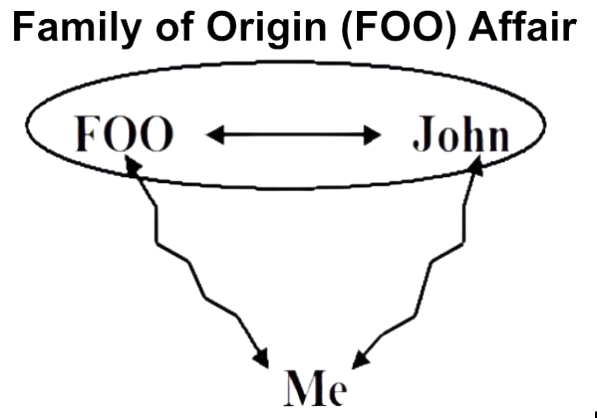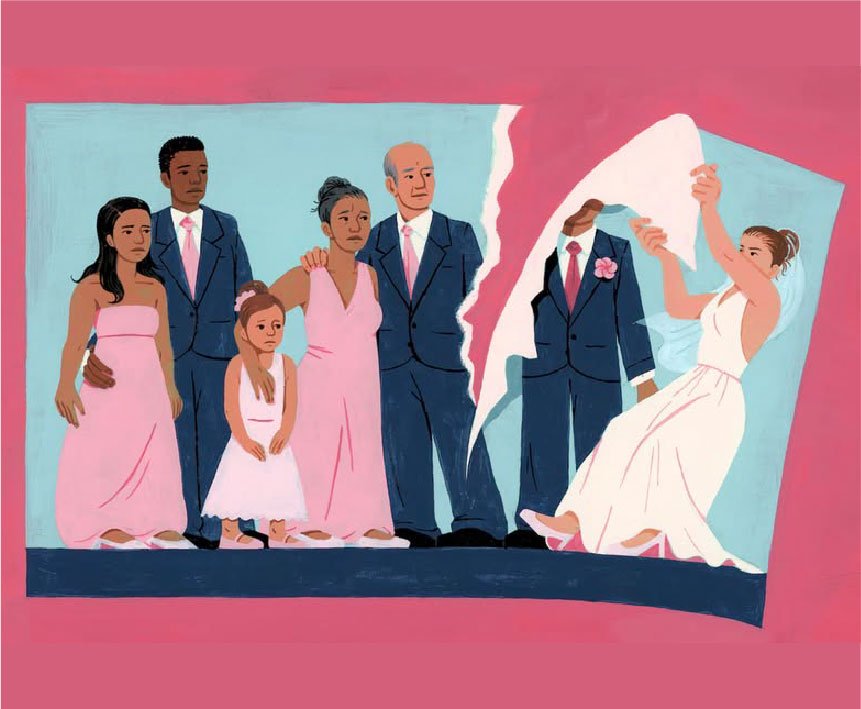Trauma and
Enmeshment
Family Enmeshment
The Third Intruder

Honesty with Myself
Over Easter weekend, Jacquie and John visited his family in Florida, where unresolved wounds from their separation resurfaced. It was her first encounter with his sister since the split, and something about the interaction felt wrong. She soon realized she had never fully processed the pain of being abandoned by John’s family during the separation, especially his sister. Those buried emotions, long masked by their renewed connection, began to surface. The visit exposed a deeper trauma bond within John’s family, one that had quietly influenced their marriage all along.
Honesty with John
Since reconciling, Jacquie and John had worked hard to rebuild honest communication, so she opened up about feeling unsettled after his sister’s hug. To her surprise, John responded with immediate anger and defensiveness—focused entirely on protecting his sister. Despite Jacquie’s reassurance that she wasn’t attacking anyone, his reaction grew more intense, culminating in yelling and demands that she confront his sister or he would. Jacquie was left confused and hurt, unsure of her own feelings but even more troubled by John’s inability to support her after months of healing together. The emotional closeness they had rebuilt suddenly felt fragile.


Alone and Trapped
John spent hours at his sister’s house portraying Jacquie as the problem while casting himself as the victim. Though she knew she was expected to pretend everything was fine, Jacquie had learned to break those toxic family rules and refused to fake it. Feeling isolated, she spent the day alone and returned after everyone was asleep—later accused of shunning the family. On Easter Sunday, she remained quiet, holding back tears until she finally excused herself. Moments later, John burst into the room, screaming that she was rude and selfish. In that moment, it became clear—Jacquie had been made the enemy.
Rule Breaking
In John’s family, codependent rules were unspoken but strictly upheld, mainly to protect his mother’s fragile emotions at all costs, even at the expense of one’s own well-being. By refusing to fake a smile or pretend everything was fine, Jacquie broke the family’s unspoken “don’t feel” rule. In hindsight, she wished she had been honest from the start, spoken up, and even left for a hotel if needed. Though doing so would have also violated the “don’t talk” rule, at least the truth would have been out. Instead, she stayed silent, and the emotional cost was hers alone to bear.


Covenant Breaking
Jacquie believed marriage was a sacred covenant, one that should place the spouse above all else and protect the relationship from outside interference. But that boundary had been repeatedly broken, first by alcohol, then by rage, and now by John’s family. This ongoing pattern of triangulation created unhealthy dynamics, positioning Jacquie as the common enemy, especially in the eyes of his sister. Brené Brown calls this triangulation “common enemy intimacy,” a false closeness built on shared opposition. While sobriety and trauma therapy had removed alcohol and rage from the marriage, family enmeshment remained, and it would prove to be the most difficult challenge of all.
Dodging Divorce
A Miracle Finish

Secret Conversations
Over the next two months, Jacquie and John worked with their therapist to establish healthy boundaries, including full transparency in communication with his family. However, John failed to follow through, secretly communicating with his family and attacking Jacquie when she confronted him. After intercepting derogatory messages and discovering a new passcode on his phone, John’s anger escalated. He revoked his commitment to transparency, berated Jacquie in front of their children and her mother, and threatened divorce. It felt as though John’s family had become the “other woman” in their marriage, and Jacquie found herself fighting an impossible battle.
Abandoning Hope
The following Monday, Jacquie told her therapist she was done with the marriage, unable to fight against John’s family any longer. Despite their struggles with addiction, rehab, and rage, she felt his family would be the final obstacle. The therapist expressed regret, and the next day, John saw him alone. The therapist warned him that without addressing his trauma, he’d lose his marriage. On Wednesday, John had a breakthrough. He cried out to God in desperation: “What is wrong with me? Why do I keep doing these things?” And then, as if whispered in his ear, he heard: “What about that time you were ten?” He scheduled a therapy appointment for Friday morning to explore it further.


Facing the Past
By Thursday morning, Jacquie and John had stopped speaking. As Jacquie prepared to contact an attorney, John handed her a piece of paper describing childhood sexual abuse, something he had never revealed in twelve years of marriage. Though emotionally detached, John feared being dismissed. Instead, Jacquie responded with compassion, validating his experience and assuring him it wasn’t his fault. As he opened up for the first time, vivid memories surfaced, leading to his first panic attack. Jacquie stayed by his side, helping him begin the painful but necessary journey toward healing.
Restoring Innocence
On Friday morning, John reluctantly went to therapy, knowing his marriage depended on it. Through two types of trauma therapy models, IFS and EMDR, he connected with his inner child, who was still trapped in the place where the abuse occurred, waiting for his family to come home and rescue him. When asked what he needed to leave, the boy replied, “I can’t leave without my innocence.” Their therapist, honoring their Christian faith, said, “Tell him Jesus can give him back his innocence.” When the boy asked, “Who’s Jesus?” Jesus appeared in the doorway of that room, extended His hand to the little boy, and said, “Come.” The boy followed Jesus and John out of the room and my husband was a different man overnight.


Restoring the Covenant
After John’s trauma resolution, the trauma bond with his family shattered. For the first time, he prioritized and protected Jacquie, even telling his family before his niece’s wedding, “If my wife isn’t welcome, neither am I.” Though Jacquie was blamed for his boundaries, John stood firm, asking for space so their family of four could heal. His emotional independence disrupted the longstanding dysfunction of an enmeshed, addiction-shaped system. While John has reconnected with his aging parents, there is ongoing conflict with his sister’s family who disagree about the priority of marriage over the family of origin. Despite the fallout, John and Jacquie are now happier than ever and have broken the cycle for their children.

